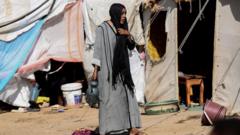On May 5, 2025, the International Court of Justice (ICJ) ruled against Sudan’s accusations towards the United Arab Emirates (U.A.E.) regarding genocide allegations in the ongoing Sudanese civil war, marking a significant legal outcome amid regional tensions.
# U.N. Court Dismisses Sudan's Genocide Accusation Against U.A.E.

# U.N. Court Dismisses Sudan's Genocide Accusation Against U.A.E.
The International Court of Justice finds it lacks jurisdiction in Sudan's claims of U.A.E.'s involvement in fueling genocide.
In a monumental ruling, the International Court of Justice (ICJ) announced on May 5, 2025, that it has dismissed Sudan's case accusing the U.A.E. of fueling genocide in Sudan's civil war. The court emphasized that it "manifestly lacks jurisdiction" to hear the case, delivering a 14-2 decision against provisional emergency measures requested by Sudan.
The case pivoted around Sudan's allegations that the U.A.E. was arming and financing the Rapid Support Forces (R.S.F.), a paramilitary group engaged in violent conflicts. Both nations are signatories to the 1948 Genocide Convention, yet the U.A.E. had previously opted out of a clause allowing legal actions in the ICJ. The court did not rule on the merits of Sudan's claims but emphasized its jurisdiction limitations.
Sudan had approached the ICJ earlier, seeking immediate action to prevent what it labeled as genocidal activities against the Masalit people in Darfur. However, the Emirati delegation contested the allegations, asserting that Sudan's evidence was insufficient and the court's authority was non-existent in this instance. This ruling raises questions about accountability in international law regarding conflicts fueled by outside nations.
The case pivoted around Sudan's allegations that the U.A.E. was arming and financing the Rapid Support Forces (R.S.F.), a paramilitary group engaged in violent conflicts. Both nations are signatories to the 1948 Genocide Convention, yet the U.A.E. had previously opted out of a clause allowing legal actions in the ICJ. The court did not rule on the merits of Sudan's claims but emphasized its jurisdiction limitations.
Sudan had approached the ICJ earlier, seeking immediate action to prevent what it labeled as genocidal activities against the Masalit people in Darfur. However, the Emirati delegation contested the allegations, asserting that Sudan's evidence was insufficient and the court's authority was non-existent in this instance. This ruling raises questions about accountability in international law regarding conflicts fueled by outside nations.




















